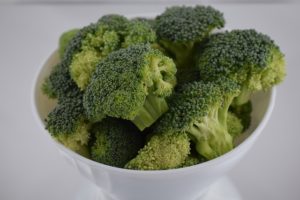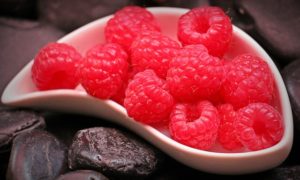The American Academy of Dermatology estimates that approximately 9,500 people in the United States are diagnosed with skin cancer every 24 hours, and that nonmelanoma skin cancer affects more than 3 million Americans per year.
You may be asking yourself, “is there anything I can do to avoid skin cancer?” As a matter of fact, one key strategy is to eat as healthy as you can. And to help kick-start your anti-skin cancer diet, here are ten foods you should consider adding to your daily meals:
Superfood #1: Asparagus

Several types of research conclude that people who include asparagus in their diet have fewer wrinkles than those who do not. Asparagus has one of the highest concentration of glutathione, a powerful antioxidant with the primary function to alleviate oxidative stress. In addition to protecting the cells from oxidation, glutathione is also efficient in detoxifying foreign substances like carcinogens. It also boosts the immune system by influencing lymphocytes.
Superfood #2: Avocados
Avocados are compact with nutrients that are thought to reduce the risk of skin cancer. They are among the best dietary sources of glutathione, the body’s master antioxidant. These incredibly creamy fruits are also a great source of vitamin C and E, which are both associated with lower risk for certain cancers. As an added bonus; avocados are low in pesticides.
Superfood #3: Broccoli 
The nutritional value of broccoli is excellent for fueling your anti-skin cancer diet. Broccoli contains extraordinary compounds that may eliminate carcinogenic toxins, induce apoptosis in cancer cells, reduce DNA mutation, help prevent the development of malignant tumors, and help stop cancer cells from spreading organ after organ.
Broccoli sprouts are a particularly rich source of cancer-fighting compounds, and broccoli florets also provide significant amounts. To maximize the benefits of broccoli, make sure to eat it raw. Consumption of raw broccoli results in faster and better absorption of the cancer-fighting compounds, whereas cooking it can destroy up to 90% of sulforaphane — the critical anti-cancer substance in broccoli.
Superfood #4: Carrots
Carrots are an essential vegetable to include in your diet if you want to avoid skin cancer. Their high beta-carotene content is excellent for protecting the skin against harmful ultraviolet radiation. When buying carrots, remember that those with the deepest, darkest color have the most beta-carotene. It is also advisable to choose organically grown produce whenever possible since conventionally grown carrots may contain high levels of chemicals and pesticides.
Superfood #5: Kale
Kale is a superfood for many reasons, including the fact that it is a rich source of vitamin C and beta-carotene (kale contains ten times more beta-carotene than broccoli). As a result of its high concentration of vitamin C, beta-carotene, and several other antioxidant phytonutrients, kale is one of the vegetables with the highest Oxygen Radical Absorbance Capacity rating — the measure of the total antioxidant power of foods.
Superfood #6: Raspberries 
Raspberries are packed with a combination of sweet and tart flavors. Not only are they a perfect addition to any dessert, but they are also loaded with skin cancer-fighting compounds. Ellagic acid in raspberries are bursting with natural anti-carcinogen and anti-mutagen properties. In some cases, the acid can even cause apoptosis or cancer cell death.
The ellagic acid in red raspberries can retain its potency through heating and freezing. Thus, regardless of whether you eat your raspberries fresh, frozen, or heated, you will be able to reap their skin cancer-fighting benefits.
Superfood #7: Shiitake Mushrooms
Shiitake mushrooms are a staple in Chinese and Japanese cuisines for excellent reasons. They are an abundant source of selenium, with a single cup providing more than half of the recommended daily intake for this cancer-fighting mineral. Furthermore, shiitake mushrooms are one of the primary sources of beta-glucans, which help fight skin cancer by passing immune cells into the cancerous area and thereby destroying cancer cells.
Superfood #8: Salmon
Salmon serves as a nutritious source of omega 3-fatty acids, which are often in short supply in Western diets. Research suggests that fatty acids can help protect the skin from ultraviolet damage. In addition to omega-3s, salmon also contains astaxanthin, a carotenoid that gives salmon its pink color. Carotenoid is a powerful antioxidant that scavenges free radicals created by skin exposed to ultraviolet rays. To get the most astaxanthin, always buy fresh, wild salmon. Astaxanthin is much higher in wild salmon than in farmed salmon. Furthermore, wild salmon contains low levels of Polychlorinated Biphenyls (PCBs), which are harmful chemicals often found in farmed salmon.
Moderation is a crucial aspect of wild salmon consumption. Frequent consumption of salmon and other fish may predispose you to excessive toxins such as mercury and pesticides. The Food and Drug Administration (FDA) recommends eating fish to a maximum of twice a week. Pregnant women and women who are trying to conceive should take this advice seriously because the toxins found in fish can impair the neurological development of the fetus.
Superfood #9: Sweet Potatoes 
Sweet potatoes are not only some of the oldest vegetables known to man, but they are also one of the most nutritious, containing plenty of skin cancer-fighting properties. The orange, pink, and yellow varieties of sweet potatoes are among the most concentrated food sources of beta-carotene. These vegetables are also an excellent source of vitamin C and idiosyncratic root proteins which may have significant antioxidant activity. Also, sweet potatoes, even the non-organically grown produce, are low in pesticides.
Superfood #10: Watercress
Eating fresh watercress on a daily basis can significantly reduce blood cell DNA damage, which is an indicator of a person’s overall cancer risk. Watercress possesses a special mustard oil called Phenethyl Isothiocyanate (PEITC), which has powerful cancer-fighting properties. Its anti-cancer properties are also attributed to its high concentration of vitamin C, beta-carotene, and lutein.
Conclusion
Skin cancer is a serious disease that requires immediate medical attention. The information above is not intended or implied to be a substitute for professional medical or health advice, and only suggests specific nutrients that may help prevent the occurrence of skin cancer.
If diagnosed with cancer of the skin, contact New Hope today at 480-757-6573 for a cross between conventional and alternative cancer treatments to combat your disease.


